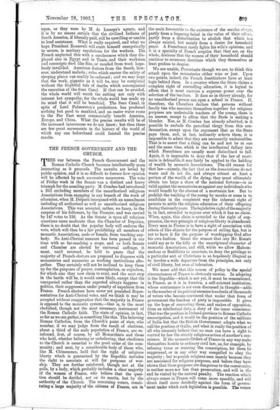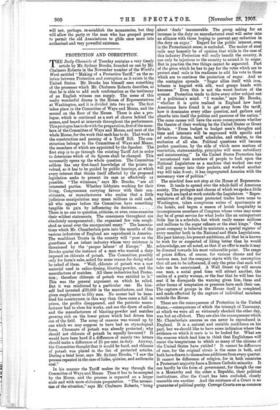THE FRENCH GOVERNMENT AND THE CHURCH. T HIS war between the
French Government and the Roman Catholic Church becomes intellectually more interesting as it proceeds. The recruits are levied by public opinion, and it is so difficult to foresee how opinion will be affected by each successive manoeuvre. The vote of Friday week in the Senate was a distinct and heavy triumph for the assailing party. M. Combes had introduced a Bill excluding members of the unauthorised religious Associations from engaging in any branch of the work of education, when M. Delpech interposed with an amendment including all authorised as well as unauthorised religious Associations. This was accepted, rather, we fancy, to the surprise of his followers, by the Premier, and was carried by 147 votes to 136. As the Senate is upon all religious questions more moderate than the Chamber of Deputies, there is no doubt that the popular body will endorse the vote, which will then be a law prohibiting all members of monastic Associations, male or female, from teaching any- body. No Anti-Clerical measure has been passed in our time with so far-reaching a scope, and as both Senate and Chamber are elected by universal suffrage, it must, until reversed, be held to prove that the majority of French electors are prepared to dispense with monasteries and nunneries as working institutions alto- gether. They certainly will not be inclined to keep them up for the purposes of prayer, contemplation, or expiation, for which also they now claim to exist, and the next step in the battle will be, it would seem likely, except that the unexpected rather than the expected always happens in politics, their suppression under penalty of expulsion from France. French electors have never yet punished Repre- sentatives for Anti-Clerical votes, and we think it may be accepted without exaggeration that the majority in France is opposed to the monastic system,—that is, to the most cherished, though not the most necessary, instrument of the Roman Catholic faith. The state of opinion, in fact, so far as we can gather, is something like this. The believing Roman Catholics, from the Church's point of view, who number, if we may judge from the result of elections, about a third of the male population of France, are re- inforced, first, of course, by all Monarchists and those who hold, whether believing or unbelieving, that obedience to the Church is essential to the good order of the com- munity; and next, by a considerable body of those who, like M. Clemenceau, hold that the right of religious liberty which is guaranteed by the Republic includes the right to associate at will for purposes of wor- ship. They are further reinforced, though not at the polls, by a body, which probably includes a clear majority of the women of France, who believe that the ques- tion should be decided, not on its merits, but by the authority of the Church. The remaining voters, consti- tuting a large majority of the citizens of France, are is the main favourable to the existence of the secular clergy, partly from a lingering belief in the value of their offices, partly from a disinclination to abolish that which has always existed, but mainly from a desire for household peace. A Frenchman rarely fights his wife's opinions, and it is a specialty of French sceptics that they are, on the whole, desirous that the women of their household should continue to reverence doctrines which they themselves at least profess to despise.
We are unable, Protestants though we are, to think this attack upon the monasteries either wise or just. Upon two points, indeed, the French freethinkers have at least logic behind them. In a country where the State claims a. complete right of controlling education, it is logical to affirm that it must exercise a supreme power over the selection of the teachers. It does so in theory already, for no unauthorised person can open a school in France. If, therefore, the Chambers declare that persons without family ties who associate themselves together for religious purposes are undesirable teachers of the young, there is no answer, except to affirm that the State is making a blunder. Nor, as M. Combos has already admitted, is it possible to exclude the parochial clergy from this con- demnation, except upon the argument that as the State pays them, and, in fact, indirectly selects them, it is impossible to admit that they are necessarily undesirables. That is to assert that a thing can be and not be at one and the same time, which is the intellectual fallacy into which Frenchmen are usually most disinclined to fall. Again, it is impossible to deny that if the law of inert- main is defensible, it may fairly be applied to the holding of wealth by monastic Associations. The old reason for that law—namely, the fact that as the Associations do not waste and do not die, and always attract at least a portion of the wealth of the dying, they must ultimately obtain too large a share of the national fortune—is as valid against the monasteries as against any individuals who would benefit by the absence of a mortmain law. But to prohibit the teaching of the young by monks or nuns is to annihilate in the completest way the inherent right of parents to settle the religious education of their offspring during theirearlyyears. Thelegislative right of themajority is, in fact, extended to regions over which it has no claim. When, again, this claim is extended to the right of sup- pression, the very principle of religious liberty is abandoned. Every man in France is to have a right of association with others of like objects for the purpose of selling figs, but is not to have it for the purpose of worshipping God after his own fashion. Grant the utmost that any Mr. Kensit could say as to the folly or the unscriptural character of monastic Associations, and still, while we allow Mahom- medans or Buddhists to associate, to deny the privilege to a particular sect of Christians is so hopelessly illogical as to involve a wide departure from the principles, not only of civil liberty, but even of toleration.
We must add that this course of policy in the special circumstances of France is obviously unwise. In adopting it the Republic—which is not yet, it must be remembered, in France, as it is in America, a self-existent institution, whose continuance is not even discussed in thought—adds to the number of its political enemies hundreds of thousands of voters who become convinced that under that form of government the freedom of piety is impossible. It gives up the hope of converting them, and makes of opposition, from an intellectual duty, a duty of the inner conscience. That was the position in Ireland previous to Roman Catholic emancipation, and it would be the position of the millions of India but that the British Government adopts what we call the position of Galli°, and what is really the position of all who sincerely believe that no man can have a right to control by law the strictly religious action of another's con- science. If the monastic Orders of France in any way make themselves hostile to ordinary civil law, as, for example, by refusing taxes or resisting the conscription, let them be suppressed, or in any other way compelled to obey the majority ; but to punish religious men merely because they are associated for religious purposes, and before they have shown that those purposes are dangerous to the community, is neither more nor less than persecution, and will in the end be visited by the natural penalty. The reaction which always comes in France will come more speedily, and will direct itself more decidedly against the form of govern- ment under which such legislation is possible. The voters



















































 Previous page
Previous page